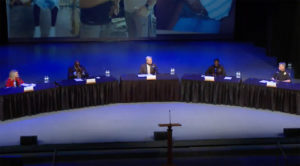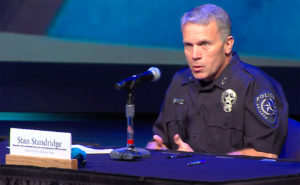ABILENE—The Hardin-Simmons University campus community paid tribute to the life of Jonathan Price—a 31-year-old African American who was killed by a white police officer—and heard a panel discuss issues related to racism and policing.
Price, who studied business and played football at HSU in 2008, was shot and killed Oct. 3 after witnesses said Price attempted to break up a domestic disturbance at a convenience store in Wolfe City.
Shaun Lucas, who subsequently was fired from the Wolfe City Police Department for what city officials called “his egregious violation of the city’s and police department’s policies,” has been charged with murder.
‘Why does this have to happen?’
In an Oct. 13 chapel service, HSU President Eric Bruntmyer called Price “a hero” in his Northeast Texas hometown who was known as “a mentor, a motivational speaker and a community servant.”

Driving to and from Price’s memorial service in Wolfe City, Bruntmyer said he was plagued by the question, “Why does this have to happen?”
Bruntmyer moderated a panel discussion during the undergraduate chapel service that included panelists Travis Craver, director of spiritual formation at HSU; Ryan Bowman, director of multicultural affairs at Abilene Christian University; Stan Standridge, chief of the Abilene Police Department; and Sandy Self, an attorney and director of legal studies and forensic studies at HSU.
From all indications, Jonathan Price was “acting in the moment” to exemplify Christ by seeking to stop an act of domestic violence, Craver observed.
“He saw a need and he acted, and he was trying to do the right thing,” Craver said.
‘Faith is defined by moments of crisis’
Based on most accounts of the incident in Wolfe City, Price was killed for “living the gospel” in a tense and fearful moment, acting as a peacemaker in “a world that has lost its way,” Bowman observed.

“For those of us who consider ourselves believers, our faith is defined by moments of crisis,” he said.
Bowman pointed to the need for Americans to examine the “love deficiency” within themselves. He observed the nation is “in crisis,” and Christians are not exempt from the fear and hatred prevalent in society.
“We even track the mud of this stuff into the sanctuary where God exists,” he said. “And our children are watching us.”
Bowman called for “heart surgery”—removing the blockages of all that prevents love from flowing.
Begin with admission of wrongdoing
A first step toward forgiveness and correction is admitting wrongdoing, said Standridge, president of the Texas Police Chiefs Association.

“On behalf of my chosen profession, let me say there can be no future without admission—admission of wrongdoing,” he said.
Rather than circling the wagons and saying “no” to reform in law enforcement, Standridge said his position—and the stance of most police chiefs—is “yes, plus some.”
Specific policy revisions—such as banning the use of chokeholds—are needed, but they are “not the panacea” to correct the problem of excessive force, he said.
Greater investment, higher standards
“Defunding the police right now is the worst thing that we could do, because we’ve got to start investing in the police if ultimately you are going to be safe out there on the streets,” Standridge said.
Society needs to invest more in training police officers and encourage the pursuit of accreditation in order for law enforcement to improve as a profession, he insisted. Accreditation requires compliance with 170 best practices and opens departments to evaluation by a certifying entity.
Only about 200 of more than 2,700 law enforcement organizations in Texas are accredited, which Standridge called “woefully inadequate.”
He also pointed to the need to “invade law enforcement culture” with the concept of what’s called “active bystandership” to create an environment that encourages responsible peer and citizen intervention.
Standridge also called for resources to help law enforcement officers deal with the trauma to which they constantly and repeatedly are exposed.
“There is a direct correlation between officers with unaddressed trauma and excessive use of force,” he said.
Swift action an encouraging sign
The swift action taken after the shooting—including the Texas Rangers quickly wrapping up their investigation and bringing homicide charges against the officer involved—offers good reason to believe “justice will be done” in the case of Price’s death, Self said.
“It speaks volumes how quickly Shaun Lucas was arrested after this happened,” she said.
The presence of body camera video also presents good reason to believe a just verdict will be rendered, she added.
“I don’t know the evidence. I haven’t seen the body cam footage, obviously. But I believe in my heart this will end up in a just verdict for Jonathan,” she said.
‘Racism is a spiritual issue’
Bruntmyer challenged white students to reach out to their Black and Hispanic peers and ask permission to accompany them to their churches.
“It sounds to me like racism is a spiritual issue,” he said.
Bowman, in turn, urged minority students to “open up,” allowing white students to enter into their lives and confront the unknown with courageous faith.
“It’s not until we start to dialogue and start to get familiar with one another that relationships will change,” he said.
That involves moving out of comfortable positions and practicing proactive love, he asserted.
“We can stay in the pocket of frustration and hatred, but it takes a courageous faith and courageous action to say, ‘I want to be part of a greater change,’” Bowman said.
View the chapel service, including the panel discussion, here.















We seek to connect God’s story and God’s people around the world. To learn more about God’s story, click here.
Send comments and feedback to Eric Black, our editor. For comments to be published, please specify “letter to the editor.” Maximum length for publication is 300 words.